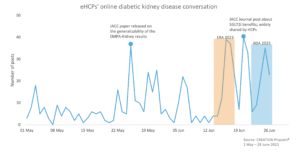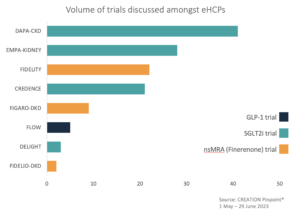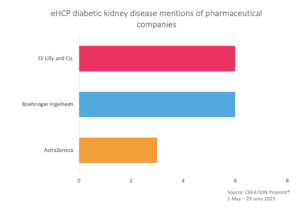27.09.2023 | Insight
Healthcare professionals celebrate new data in diabetic kidney disease
In the lead up to ADA 2023, healthcare professionals (eHCPs) around the world discussed a wide variety of treatments and trials related to diabetic kidney disease (DKD). With the launch of Bayer’s finerenone in 2021, there is now another treatment in a landscape which is changing and expanding rapidly. It joined SGLT2 inhibitors and GLP-1 agonists, well-established diabetes drugs which are now moving towards use in the treatment of DKD. Amongst all these conversations, the excitement of eHCPs shone through.
Novo Nordisk’s semaglutide (Wegovy, Ozempic) and liraglutide have gained attention from HCPs worldwide for their positive effects on diabetic weight control. The FLOW trial, currently in stage three, is the first to investigate semaglutide’s effect on diabetic patients with chronic kidney disease. Similarly, SGLT2 inhibitors have received additional indications, increasing the options available for eHCPs and patients.
Using CREATION Pinpoint®, we analysed the unprompted online conversation of nearly 1,800 eHCPs in the lead up to ADA 2023, with almost 6,200 posts. Looking into the DKD specific conversation from 410 healthcare professionals worldwide in over 620 posts within this dataset; what treatments and trials were eHCPs talking about?

SGLT2i trials were the most spoken about in the DKD space
The online diabetic kidney disease conversation was heavily geared towards disseminating data and the results of clinical trials. Of the 663 posts identified, 466 (70.1%) concerned clinical trials and data. During ADA 2023, this figure dropped mildly to 53% as HCPs highlighted talks and events happening around congress.
Of all posts around clinical trials, the DAPA-CKD trial, which looks at dapagliflozin in preventing adverse DKD outcomes, was the most widely spoken about. Discussions around the results were collaborative in nature, with a number of eHCPs asking peers on X (formerly Twitter) how the data should be interpreted.
I remain excited by the potential for kidney protection with GLP-1RA. Looking forward to the results of #FLOW trial as we approach the end of the study. Surprised there isnt a tirzepatide renal outcome study yet (to my knowledge) https://t.co/bahf3TPgdd
— Vlado Perkovic (@VladoPerkovic) June 5, 2023
Other eHCPs, such as a diabetic consultant in Denmark, celebrated SGLT2i as working “well across gender and age groups!” in the treatment of diabetic kidney disease.

Alongside the upward trend amongst HCPs talking about SGLT2 inhibitors across different therapy areas, finerenone and its various trials received a good amount of attention from those within the online diabetic kidney disease conversation. Over a quarter of all DKD trial conversation centred around finerenone alone. For example, one cardiologist in Brazil celebrated “newcomer” finerenone for extending “the odds of a longer and better life”. Similarly, an HCP in Egypt recommended finerenone in diabetic kidney disease patients due to “evidence from landmark trial FIGARO”.
In a post shared 20 times by eHCPs, Felice Gragano, a cardiologist, shared the results of the FIDELITY trial, declaring that use of finerenone in diabetic patients “significantly [reduces] the risk of all-cause and CV mortality”.
#Finerenone significantly ⬇️ the risk of all-cause and CV mortality (including sudden death) ☠️ compared w/ placebo in diabetes 👥 across the spectrum of CKD stages: #FIDELITY trial ⤵️https://t.co/ZbfJEASQkX@AgewallStefan @ESC_Journals #CardioTwitter #EHJPharmacotherapy 💊 pic.twitter.com/Pdl2ocbQmR
— Felice Gragnano (@FeliceGragnano) May 29, 2023
With regards to trials of GLP-1 agonists, the FLOW trial received moderate attention from HCPs. A renal physician at the University of New South Wales, Australia stated he “remain[s] excited by the potential for kidney protection with GLP-1RA”, which was shared by eHCPs in Australia, Canada and Egypt. A medical internist in Spain discussed the “future of GLP-1”, raising the question of how the FLOW trial will “add to current knowledge”.
Clearly then, there is optimism from a variety of HCP specialties about the future of diabetic kidney disease, and the increasing arsenal healthcare professionals have in treating it.
Healthcare professionals shared posts mentioning both cardiovascular health and DKD
Of the 410 posts about diabetic kidney disease almost a third also spoke about cardiovascular health. Both of the most shared posts, with a total of 96 eHCP shares between them, mentioned both kidney disease and heart failure. The high proportion of eHCPs discussing cardiovascular outcomes alongside DKD treatments suggests that this is an important factor to consider for healthcare professionals in the online conversation.
Within the finerenone conversation, over 60% of posts discussed cardiovascular outcomes alongside DKD, a sign that eHCPs are aware of the cardiovascular benefits and are looking to disseminate relevant data amongst peers.
There is potential for SGLT2i manufacturers to increase awareness of their CV benefits amongst HCPs as the average percentage of SGLT2i posts mentioning cardiovascular benefit was just under 40%. These companies could tailor messaging to address the desire amongst HCPs for information on how these treatments manage both diabetic kidney disease and cardiovascular health.
Pharmaceutical company communications generated modest conversation

Within the DKD conversation, despite all eHCP mentions of pharma companies related to SGLT2i there were no mentions of finerenone manufacturer Bayer. All mentions of both Boehringer Ingelheim and Eli Lilly were shares of Boehringer’s official X (formerly Twitter) account, announcing that the European Medicines Agency granted a “positive opinion” recommending the use of empagliflozin for the treatment of chronic kidney disease.
#NEWS: Together with @EliLillyandCo we are delighted to announce that EMA's #CHMP granted a positive opinion recommending Jardiance® (empagliflozin) for the treatment of #ChronicKidneyDisease (CKD). Read more about this important step towards approval: https://t.co/Zcm1Nz1uHx
— Boehringer Ingelheim (@Boehringer) June 23, 2023
Likewise for AstraZeneca, a press release put out by the company on June 16 addressing low screening rates for kidney disease, especially amongst diabetic people, prompted some eHCPs to discuss the topic. In one instance a US nephrologist tagged AstraZeneca’s X account, adding their view that it’s good that AstraZeneca wants to increase awareness of the prevalence of DKD.
@AstraZeneca Good on you for discovering that 95% of Stage 3 CKD patients have no idea about it. But your goal of 20% less dialysis is too modest. I've been preventing 90% of ESRD for 29 years. https://t.co/8fQxdutegb
— dwmoskowitz (@dwmoskowitz) June 21, 2023
This could serve as a guide then for other manufacturers; while HCPs talk a lot online about DKD trial results and data, they are unlikely to mention manufacturers unprompted. By increasing relevant activity on social media addressing topics important to HCPs, pharmaceutical companies may be able to generate increased HCP conversation, such as cardiovascular outcomes in patients with diabetic kidney disease, as well as screening and disease awareness.
Pharma can support eHCPs with their appetite for data
As new treatments are approved for use, and new trial data is released, the attention of eHCPs is split fairly evenly across different drug classes within the online conversation. The majority of posts during this period were heavy on quantitative data, being disseminated widely amongst eHCPs across the globe.
SGLT2i treatments were the most frequently spoken about; a trend that could be seen in the wider conversation around ADA 2023. Finerenone also received a lot of attention from eHCPs, with over a quarter of all trial posts mentioning it.
eHCPs’ appetite for, and the importance they place on, data to highlight cardiovascular outcomes for those living with diabetic kidney disease presents an opportunity for these companies to learn from and connect with eHCPs and further tap into this fast-changing therapy area.
If you want to connect with your healthcare professional stakeholders in a meaningful way then we’d love to share more examples with you and help you take your first steps. Get in touch for a free short consultation.
 By Cameron Bassindale
By Cameron Bassindale 
